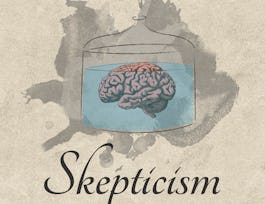Faced with difficult questions people often tend to dismiss and marginalize dissent. Political and moral disagreements can be incredibly polarizing, and sometimes even dangerous. And whether it’s Christian fundamentalism, Islamic extremism, or militant atheism, religious dialogue remains tinted by arrogance, dogma, and ignorance. The world needs more people who are sensitive to reasons both for and against their beliefs, and are willing to consider the possibility that their political, religious and moral beliefs might be mistaken. The world needs more intellectual humility.


Intellectual Humility: Theory
Taught in English
Some content may not be translated
29,842 already enrolled
(359 reviews)
Skills you'll gain
Details to know

Add to your LinkedIn profile
13 quizzes
See how employees at top companies are mastering in-demand skills


Earn a career certificate
Add this credential to your LinkedIn profile, resume, or CV
Share it on social media and in your performance review

There are 5 modules in this course
What's included
4 readings
by Dr Ian Church and Dr Peter Samuelson
What's included
10 videos4 readings5 quizzes4 discussion prompts
by Professor John Greco
What's included
8 videos5 readings4 quizzes4 discussion prompts
by Professor Peter C. Hill
What's included
7 videos4 readings4 quizzes4 discussion prompts
What's included
4 readings1 peer review1 discussion prompt
Instructors


Offered by
Recommended if you're interested in Philosophy

The University of Edinburgh

National University of Singapore

The University of Edinburgh

University of California, Irvine
Why people choose Coursera for their career




Learner reviews
Showing 3 of 359
359 reviews
- 5 stars
66.66%
- 4 stars
23.88%
- 3 stars
7.77%
- 2 stars
0.55%
- 1 star
1.11%

Open new doors with Coursera Plus
Unlimited access to 7,000+ world-class courses, hands-on projects, and job-ready certificate programs - all included in your subscription
Advance your career with an online degree
Earn a degree from world-class universities - 100% online
Join over 3,400 global companies that choose Coursera for Business
Upskill your employees to excel in the digital economy
Frequently asked questions
Access to lectures and assignments depends on your type of enrollment. If you take a course in audit mode, you will be able to see most course materials for free. To access graded assignments and to earn a Certificate, you will need to purchase the Certificate experience, during or after your audit. If you don't see the audit option:
The course may not offer an audit option. You can try a Free Trial instead, or apply for Financial Aid.
The course may offer 'Full Course, No Certificate' instead. This option lets you see all course materials, submit required assessments, and get a final grade. This also means that you will not be able to purchase a Certificate experience.
When you purchase a Certificate you get access to all course materials, including graded assignments. Upon completing the course, your electronic Certificate will be added to your Accomplishments page - from there, you can print your Certificate or add it to your LinkedIn profile. If you only want to read and view the course content, you can audit the course for free.
You will be eligible for a full refund until two weeks after your payment date, or (for courses that have just launched) until two weeks after the first session of the course begins, whichever is later. You cannot receive a refund once you’ve earned a Course Certificate, even if you complete the course within the two-week refund period. See our full refund policy.



